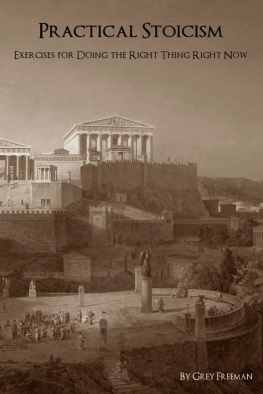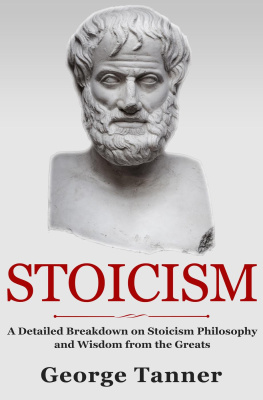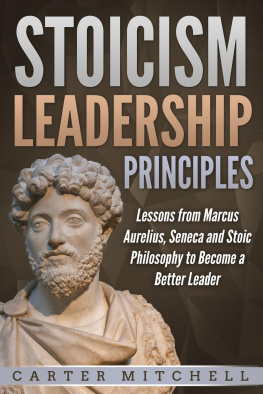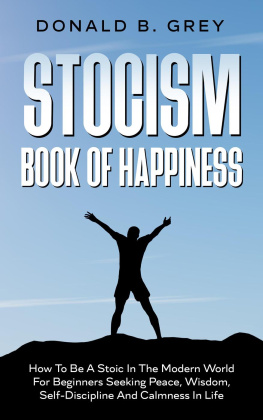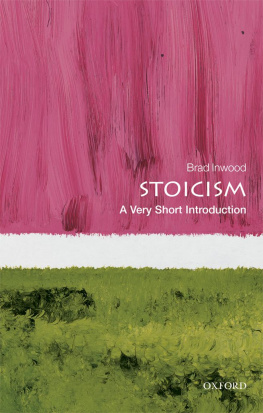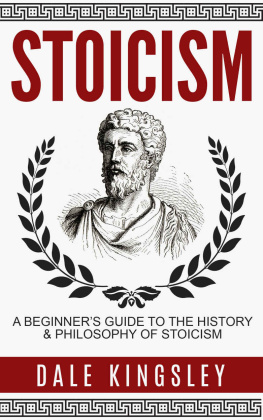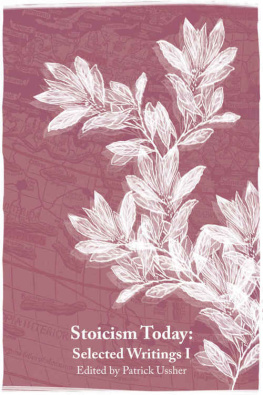Practical Stoicism
Exercises for Doing the Right Thing
Right Now
Version 2.3.2
By Grey Freeman
2017 - 2021 Grey Freeman
This work is licensed under the Creative Commons Attribution-NonCommercial-ShareAlike 4.0 International License. To view a copy of this license, visit http://creativecommons.org/licenses/by-nc-sa/4.0/.
'The Acropolis' (1846) by Leo von Klenze is in the public domain in its country of origin and other countries and areas where the copyright term is the author's life plus 100 years or less.
Dedication
To Bruce, who got it. And proved it.
Knowing is not enough, we must apply. Willing is not enough, we must do. Bruce Lee
Table of Contents
Foreword
So, how exactly does one actually do this Stoic thing? - Multiple posters on r/stoicism
Much has been written on the topic of what Stoics believe, and why, but that merely sets the table for what truly matters: The actual application of the philosophy. Because it is far too easy to continually educate and ruminate and contemplate without actually doing anything useful, I want to help minimize the gap between thought and action as much as possible by providing a short guide of practical things one can actually do to bring ones philosophy out of the world of the theoretical into the moment where we actually live.
A note on the presentation: I have broken this book into several small essays of about a page (depending on how you are reading it) apiece - one per practice. Each practice begins with a verb. Its important to understand that these are things you do, even if its all happening in your head. This is not a dissertation on theory.
This book is not a primer for the new initiate. Consider it more as a companion piece, to be read alongside other works that go further into the reasoning behind the practices discussed here. Without that component, this becomes a collection of empty ritual. Without this, those might lead you to believe that reading something inspirational is akin to doing something useful ( See the appendix for suggestions.)
Read these pages on random. The book is intended to be consumed in small bites, whenever one is idle or feeling off true, to act as a goad to do the thing that needs to be done. Contemplate a practice and consider if it seems helpful to you. And, if so, how you might integrate it into your life. Then do it. As Bruce says, Knowing is not enough.
Now I know a refuge never grows
From a chin in a hand in a thoughtful pose
Gotta tend the earth if you want a rose
Emily Saliers
Get Up
At dawn, when you have trouble getting out of bed, tell yourself: 'I have to go to workas a human being. What do I have to complain of, if Im going to do what I was born forthe things I was brought into the world to do? Or is this what I was created for? To huddle under the blankets and stay warm?'
But its nicer here
So you were born to feel nice? Instead of doing things and experiencing them? Dont you see the plants, the birds, the ants and spiders and bees going about their individual tasks, putting the world in order, as best they can? And youre not willing to do your job as a human being? Why arent you running to do what your nature demands? (Marcus Aurelius, Meditations V.1)
Like almost everything else in life, more than enough sleep is too much. Studies show that sleeping more than an average of 7-8 hours a day can lead to diabetes, obesity, headaches, back pain, and heart disease. What's worse, and more immediate, is that any hour spent sleeping beyond what your body actually needs to recuperate or repair itself is an hour you have lost forever.
An hour lost to sleep will not be available to you for meditation. That hour cannot be used to make you stronger and more resilient. It cannot be used to make the world a better place. In that hour, you will not test yourself and grow. You will do no great deeds in that hour. You will not even remember it happened. It is simply buried, eternally, beneath the sands of time. An irreplaceable treasure lost to the ages.
Better to take back the hour and use it as your nature demands. You've rested enough. Time now to take a deep breath and get on with living your life.
Catch a Sunrise
The Pythagoreans bid us in the morning look to the heavens that we may be reminded of those bodies that continually do the same things and in the same manner perform their work, and also be reminded of their purity and nudity. For there is no veil over a star. (Marcus Aurelius, Meditations XI.27)
Every once in the while, find the time to get out of bed before sunrise and drag yourself to where you can see it. It doesnt take that long and its a magnificent sight. Think of your place in the universe. Consider that, whatever youve done before, here is one more chance to get it right.
There are no guarantees youll see another one. Use this opportunity wisely.
Prepare for Battle
Cling tooth and nail to the following rule: Not to give in to adversity, never to trust prosperity, and always to take full note of fortunes habit of behaving just as she pleases, treating her as if she were actually going to do everything it is in her power to do. Whatever you have been expecting for some time comes as less of a shock. (Seneca, Letters from a Stoic)
One way (of several) to do the Premeditatio Malorum, the premeditation of evils, is to start your day with a walk through your calendar. Consider what you will do, where you will go, and who you will meet. Imagine how it might go wrong.
Now, think about how it will feel. How it will look to others. How you might be embarrassed, or angered, or disappointed. Just this part of the exercise has its benefits. It deadens the pain of the actual event, if it actually happens, through a sort of emotional-hardening process. It even extends to other, unrelated events - If you can endure sorrow better in this instance, you can endure it elsewhere.
Now consider how you might respond to this misfortune. How you might lessen the damage, soften the blow. Use this as an opportunity to do a little contingency planning. If the presentation goes poorly, is there another resource you can appeal to? Can you repurpose the meeting advantageously? Can you lay the groundwork for a second attempt?
Extend your definition of misfortune to include diversions and temptations that might challenge your values. Determine ahead of time how you will handle the free doughnuts in the break room. That cute married lady who flirts with you. That guy who is always making fun of your co-workers.
Finally, consider how you will handle the undesired emotions. How will you maintain the space you need to form a reasoned response? Just thinking about it lessens the shock. Knowing your strengths and weaknesses, what else are you going to have to do?
Now you can start the day knowing that you can still be surprised, but you cant be shaken.
Review Your Impressions
So make a practice at once of saying to every strong impression: An impression is all you are, not the source of the impression. Then test and assess it with your criteria, but one primarily: ask, Is this something that is, or is not, in my control? And if its not one of the things that you control, be ready with the reaction, Then its none of my concern. (Epictetus, Enchiridion I.5)
Review your recent emotional responses. What made you angry? What nagging fear continues to wear at you? To whom do you have antipathy? In short, what negative emotions are you experiencing? Now ask yourself why? If virtue is sufficient for fulfillment, why are you feeling anything other than serenity? To what inappropriate impression have you assented? What virtue have you lacked to allow this disharmony into your inner citadel?
Next page
